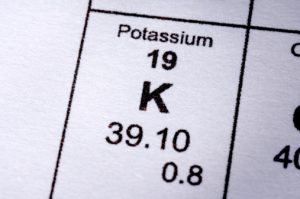 Dietary potassium has been found to protect type 2 diabetes patients against heart and kidney disease. The researchers found that higher levels of urinary potassium excretion – which is related to the amount taken in – is linked with the slower decline of kidney function and lower incidences of cardiovascular complications among type 2 diabetes patients.
Dietary potassium has been found to protect type 2 diabetes patients against heart and kidney disease. The researchers found that higher levels of urinary potassium excretion – which is related to the amount taken in – is linked with the slower decline of kidney function and lower incidences of cardiovascular complications among type 2 diabetes patients.
The findings were published in the Clinical Journal of the American Society of Nephrology.
Advertisement
Type 2 diabetes patients are at a higher risk of kidney failure and heart disease. Researchers studied 623 type 2 diabetics with normal kidney functions. Researchers aimed to uncover if higher sodium and potassium intake are associated with a higher risk of heart and kidney disease.
Higher potassium levels were associated with a lower risk of kidney and heart disease but sodium was not. Lead researcher, Shin-ichi Araki, M.D., Ph.D., said, “For many individuals with diabetes, the most challenging part of a treatment plan is to determine what to eat. The results in our study highlight the importance of a diet high in diabetes nutrition therapy.”
Recommended potassium intake per day
The following are daily recommendations for potassium intake by different age groups.
Zero to six months – 400 mg
Seven to 12 months – 700 mg
One to three years – 3,000 mg
Four to eight years – 3,800 mg
Nine to 13 years – 4,500 mg
13 years and older – 4,700 mg
Women who are lactating require higher amounts of potassium; their recommended daily allowance is 5,100 mg.
Previous study links dietary potassium and diabetes risk
There have been many studies conducted on potassium intake and diabetes. Some research suggests high potassium contributes to diabetes, while other research suggests low potassium is linked with the onset of diabetes. The variation in results stems from different measuring methods, such as 24-hour urine collections, food surveys and dietary history.
In order to determine an exact association between dietary potassium and diabetes, a more reliable, standardized method of potassium measurement needs to be found.
Healthy ways to increase potassium levels
Potassium is an essential mineral your body needs to carry out its daily functions. If you are low on potassium, you may experience the following symptoms:
- Tiredness
- Tingling or numbness
- Abdominal cramping or bloating
- Constipation
- Palpitations
- Excessive thirst and excessive urination
- Depression, psychosis, confusion or hallucinations
 There are healthy ways to increase potassium and avoid the nasty side effects that come with low potassium levels. Consuming fruits and vegetables high in potassium is a good way to increase potassium levels safely. Furthermore, the foods that contain potassium also carry other helpful nutrients your body needs. Some high-ranking potassium-loaded foods are:
There are healthy ways to increase potassium and avoid the nasty side effects that come with low potassium levels. Consuming fruits and vegetables high in potassium is a good way to increase potassium levels safely. Furthermore, the foods that contain potassium also carry other helpful nutrients your body needs. Some high-ranking potassium-loaded foods are:
- Sweet potatoes
- Beet greens
- Tomato paste
- Baked potatoes
- White beans
- Kiwis
- Avocados
- Clams
- Salmon
- Yogurt
Potassium health benefits aside from improving kidney and heart function
Aside from benefiting kidney and heart function, potassium has many other health benefits, including:
 Lowers the risk of stroke
Lowers the risk of stroke- Decreases drops in blood sugar
- Regulates muscle contractions and maintains optimal muscle and nerve function
- Prevents muscle cramps
- Improves bone healing
- Helps keep the brain healthy
- Helps normalize blood pressure by leveling sodium
- Promotes muscle tissue growth
- Boosts metabolism
- Reduces stress and anxiety
- Maintains fluid balance in the body
- Aids in critical bodily functions like moving around electrical charges
- Boosts efficiency of nerve reflexes
With all these health benefits in mind, you can see that potassium truly is essential, and you should ensure that you’re getting in the recommended amount in order to keep your body healthy.
Related Reading:
Sodium potassium balance in diet critical for renal and cardiovascular health
For good cardiovascular health and renal health you need a proper sodium potassium balance in your diet. Balanced sodium and potassium levels have been shown to lower blood pressure and lower your risk of heart disease, heart attack and stroke. Unfortunately, the typical American diet contains too much sodium, which can lead to an unbalance between the two. Continue reading…
Advertisement
Muscle cramps? You may be low on potassium
When it comes to good health, there are some essentials we can’t live without. For example, for out body to perform all it needs to do, it requires these essential minerals: Potassium, sodium, calcium, magnesium, sulfur, chlorine and phosphorus. When balanced, these seven essential minerals keep your body in check and working properly. Continue reading…
Sources:
http://www.eurekalert.org/pub_releases/2015-11/ason
http://healthyeating.sfgate.com/rda-guidelines-potassium
http://www.ncbi.nlm.nih.gov/pmc/articles
//www.belmarrahealth.com/tables/potassium-rich-foods-list
https://www.organicfacts.net/health-benefits/minerals/health-benefits-of-potassium
http://www.webmd.boots.com/a-to-z-guides/low-potassium-hypokalaemia
